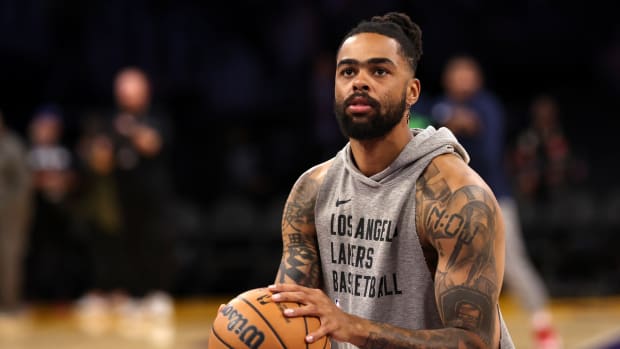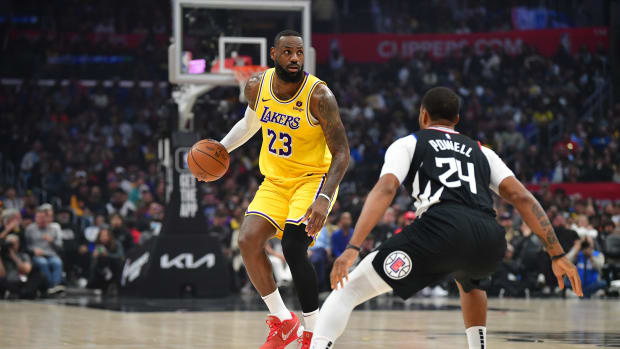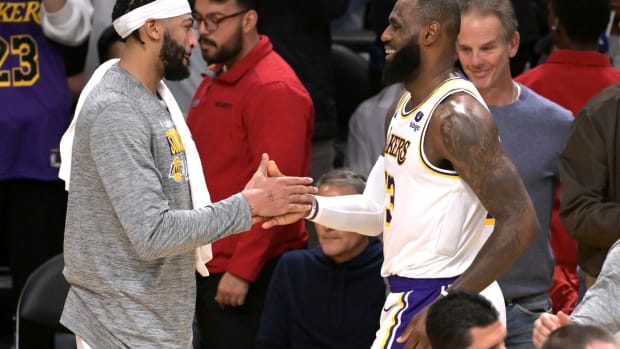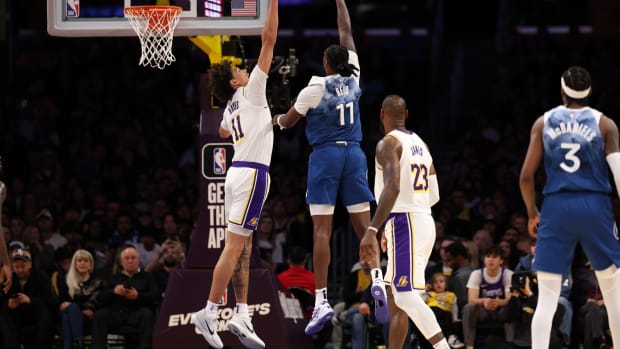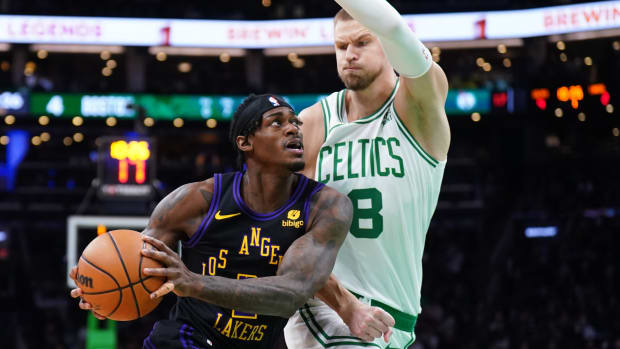Lakers: "Legacy" Week 8 Recap - L.A. Goes Big
Director Antoine Fuqua and executive producer Jeanie Buss's new 10-part documentary miniseries "Legacy: The True Story Of The L.A. Lakers" soldiers on with its eighth installment this week! With two more episodes on the docket, the end is in sight as the series moves into Kobe Bryant's second Lakers championship roster.
Episode eight begins where episode seven left off, the Kobe vs. Shaq Christmas Day 2004 face-off. As ESPN's Ramona Shelburne notes in a modern interview, the arrival of the longtime Lakers All-Star center in Miami had transformed the Miami Heat into an instant title contender, while Bryant's team was just hoping to make the playoffs.
In one of the weirder interview snippets of the episode, current team president/former Kobe Bryant super-agent Rob Pelinka appears for the first time in "Legacy" to talk about his most famous client.
"For Kobe, there was no agony of defeat," Pelinka said. "It was gonna be a win for him either way. If the Lakers won the game, it was a win. If the Lakers lost and someone out-dueled him it was a win because he knew that would be his motivation to fuel the next challenge." If this is really how Bryant framed the contest, this serves as a fascinating insight into Bryant's psyche. Even when he lost, he still needed to feel like he had won.
At the end of the game, Bryant called for a Phil Jackson pet play (the "What The F" play), because he didn't trust new coach Rudy Tomjanovich's late-game decision-making. When this happened, Jeanie Buss realized that Bryant missed his old head coach.
O'Neal's Heat would eventually win a nail-biter, 104-102.
The documentary zooms out to discuss the team's 2004-05 Rudy Tomjanovich season. Jim Buss played a big role in the hiring of Tomjanovich, a former two-time champion head coach with Hakeem Olajuwon's Houston Rockets. Kurt Rambis criticizes Tomjanovich's five-year, $30 million deal, a contract decision which he lays at the feet of Jim Buss. Jim disputes this, claiming the hire was green-lit by his father, team governor Dr. Jerry Buss.
Under the glare of intense media scrutiny, Tomjanovich ultimately stepped away from the team halfway through the season, with the club sporting a decent 24-19 record. Things fell apart under interim head coach Frank Hamblen (who is not mentioned), who led the team to a 10-29 record. L.A. finished with a 34-48 record, missing the playoffs in its first season sans Shaq.
Phil Jackson returned in June 2005. He discusses conversations he had with Bryant ahead of his return, and in his interview indicates that the Lakers' superstar shooting guard told him he would be more amenable to his coaching insights moving forward.
We are treated to some more of the Buss kids' politicking. Jackson notes that Jim had started to handle the basketball side of things more than Dr. Buss. The documentary covers L.A.'s most famous Jim Buss-inspired draft pick, 17-year-old center Andrew Bynum, selected at No. 10 straight out of high school during the 2005 draft. L.A. knew it needed a long-term replacement for the departed Shaquille O'Neal, and Buss was intrigued by the young seven-footer's upside. It would prove to be a solid selection, though injuries and locker room drama did cloud the big man's Los Angeles tenure.
Longtime physical trainer Gary Vitti and even Bynum's teammate Derek Fisher were aware that Bynum's body was uniquely predisposed to injury. Bynum ultimately emerged as the team's starting center during its three straight Finals runs -- when healthy. A knee injury forced him to sit out the team's 2008 postseason (when L.A. lost to the Celtics), and he had to battle through subsequent knee problems during the team's 2009 and 2010 title runs. Though he was severely limited in the 2009 postseason, but Bynum did manage to eke out a role as a more meaningful contributor while playing hurt for the Lakers' 2010 championship team. Understandably, Bynum did not sit for an interview in "Legacy." For further thoughts on the Bynum era, check out this look back.
The documentary briefly covers Bryant's historic 81-point night in a 122-104 victory against Chris Bosh, Jalen Rose and the rest of the Toronto Raptors on January 22nd, 2006. The 6'6" All-Star shooting guard had a season to remember during his 2005-06 run with L.A. Though the team would finish with the seventh seed in the West and a 45-37 record, Bryant led the league in scoring, averaging 35.4 points a night on a high-volume .450/.347/.850 shooting splits. The 27-year-old would finish fourth in MVP voting. The top two that year? Eventual Lakers Steve Nash and LeBron James.
We next witness Shaquille O'Neal winning an NBA title with Pat Riley's Miami Heat in 2006, thanks mostly to the effort of the Big Diesel and his new shooting guard running mate, Finals MVP Dwyane Wade.
Rob Pelinka says in an interview now that he asked Kobe to explain the thinking behind changing his jersey number from 8 to 24 at the start of the 2006-07 season (i.e. right after Shaq won his first and only title without Kobe). "He said 'Carpe diem,'" Pelinka notes. "'There's 24 seconds on the shot clock. Every second of your day matters. And that's what this number represents."
During his first season as No. 24, Bryant again led the league in scoring. In 77 contests with L.A., Bryant averaged 31.6 points with a .463/.344/.868 slash line. Future Laker Carmelo Anthony finished second that season, averaging 28.9 points.
To the tune of Nas's "Hate Me Now," we're treated to a montage of Kobe, in his new jersey, crushing it during the 2006-07 season and beyond. It's probably the highlight of the episode, aside from the Bynum drama.
Frustrated at what he perceived to be the front office's disinterest in surrounding him with a "win-now" team, Bryant demanded a traded during the summer of 2007. Though Dr. Jerry Buss and Mitch Kupchak kicked the tires on a few potential deals, the team was able to talk Bryant off the ledge in the short-term.
Everything turned around midway through the 2007-08 season, when Kupchak pulled off what at the time appeared to be one of the most one-sided deals ever: the Pau Gasol heist on February 1st, 2008. In exchange for Memphis Grizzlies All-Star center Pau Gasol and a future second-round pick, the Lakers shipped out disappointing starting center Kwame Brown, reserve combo guard/eventual convicted murderer Javaris Crittenton, bench wing Aaron McKie, the draft rights to 2007 No. 48 draft pick Marc Gasol, Pau's little brother (still overseas at the time), and L.A.'s 2008 and 2010 first-round selections.
At the time, the deal seemed incredibly one-sided. Pau Gasol was an All-Star in his prime, and instantly made the Lakers a legitimate contender. The younger Gasol was an out-of-shape "project" pick at the time, but he would eventually become a pillar for the "Grit 'n' Grind" era of the Memphis Grizzlies, featuring many deep postseason runs. An excellent post passer and defender, Marc would eventually become a three-time All-Star, a two-time All-NBA selection, and the 2013 Defensive Player of the Year. He would go on to win his lone title in 2019 as the starting center of the Toronto Raptors. He played his last NBA season in 2020-21 with your Los Angeles Lakers, though that ultimately ended sourly and he returned to his native Spain, where he continues to play for Bàsquet Girona. Like Pau, Marc Gasol seems to be a safe bet to qualify for Hall of Fame honors in Springfield some day soon.
The Lakers had finally surrounded Kobe Bryant with a roster worthy of his talents. The team's three-headed frontcourt monster of Pau Gasol, Andrew Bynum, and talented sixth man Lamar Odom made it a formidable threat in the Western Conference instantly. Bryant would go on to win his only league MVP award that season, while leading Los Angeles to a 57-25 record. "Legacy" unpacks L.A.'s first return to the NBA Finals in four years, where it would fall to the Boston Celtics' Big Three of Kevin Garnett, Paul Pierce and Ray Allen in six games.
Future Lakers champion Rajon Rondo, then the starting point guard for Boston, sat down for an interview, remarking on his relative lack of awareness for the great Lakers-Celtics rivalries of decades past as a 22-year-old pre-All-Star.
Pau Gasol, Lamar Odom, starting point guard Derek Fisher, and reserve forward Luke Walton (starting small forward Trevor Ariza has yet to appear) all reveal in modern interviews that they were questioning themselves during that Finals loss. The Lakers were worried that they might not ever be able to get back to the mountaintop in a deep Western Conference.
Stunningly, the "Legacy" documentary actually unpacks Shaquille O'Neal's infamous "Kobe, tell me how my ass tastes" rap after his former teammate fell to Boston. O'Neal was Steve Nash's running mate with the Phoenix Suns at the time.
To kick off the 2008-09 season, Bryant appeared to get a bit more Zen, embracing his teammates and coaches with more kindness. Jackson reveals that he and Bryant discussed revising Bryant's approach to the year ahead of the season.
"Coming back that next year, from a leadership standpoint, he just was a more balanced, calm, relaxed dude," Fisher says. "Like, he still wanted to win and obsessed about winning, but he started to process and understand... human interaction and relationship[s] in a different way."
We then track the Lakers’ first championship of its jumbo-sized Kobe Bryant/Pau Gasol mini-dynasty era.
Three-time Lakers center Dwight Howard, then the 2009 MVP runner-up as the Orlando Magic's All-NBA center, talks in the documentary about how the Lakers felt destined to win in their five-game 2009 Finals bout, thanks in part to some spectacularly semi-impossible-seeming Black Mamba finishes. “I was like, ‘Man, it must be their time,’” a reflective Howard says mournfully.
Derek Fisher had a similar thought, noting that, with the victory (his and Bryant's fourth with L.A.), it felt as if the Lakers “were back where we belong” at the top of the league.
"Legacy" remains pretty darn riveting for Lakers fans and agnostics alike. The next chapter seems likely to cover the Kobe/Pau Lakers' second straight title in 2010, the second (and so far final) departure of Phil Jackson in 2011, the hilariously-misnamed "Now This Is Going To Be Fun" Lakers, and the passing of Dr. Jerry Buss in 2013, and the subsequent Buss battle between Jeanie and Jim for control of the franchise. I'd imagine the final episode will discuss the LeBron James era and Bryant's untimely death.




